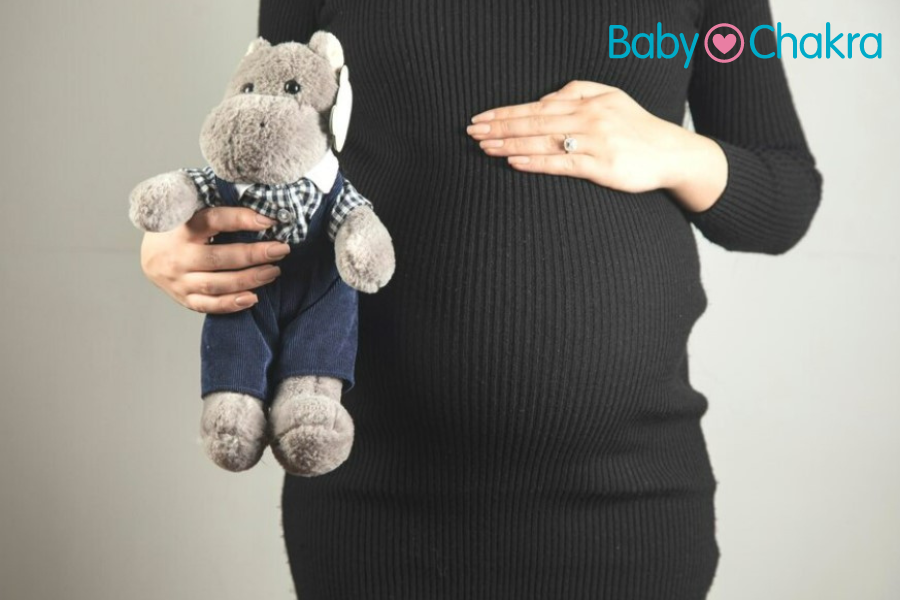
When Can You Hear Your Baby’s Heartbeat: A Week-By-Week Chart
16 Jun 2022 | 6 min Read
Sudeshna Chakravarti
Author | 799 Articles
As a new parent-to-be, hearing your baby’s heartbeat for the first time is an exciting milestone! Your healthcare provider will let you listen to the thump-thump of your baby’s heartbeat during your prenatal ultrasound. Heartbeat also indicates that your pregnancy is progressing healthily.
In some cases, if done early, your baby’s heartbeat may not be heard during the first ultrasound. But don’t worry; your healthcare provider can still monitor your baby’s well-being and see their beating heart on the screen. So not hearing your baby’s heartbeat during an initial ultrasound shouldn’t be a cause for concern.
Read on, as we fill you in with more details about your baby’s heartbeat, what it indicates, and the changes in their heart rate throughout pregnancy.
When Can You Hear Your Baby’s Heartbeat For The First Time?
Your little one’s heart starts to beat as early as the 5th week or 22 days of your pregnancy. If you go for an early ultrasound scan, around the 6th week of your pregnancy, you will be able to hear and see your baby’s heart beating.
You can also listen to their beating heart during your first doppler ultrasound, which is a part of your first prenatal check-up, scheduled around the 12th or 14th week of your pregnancy, or later in some cases.
In some cases, your baby’s position in the womb may prevent you from listening to their heartbeat in either of the ultrasounds, but you don’t have to worry or panic about it. Your doctor will conduct a follow-up ultrasound where you can listen to your baby’s heartbeat.
Why You May Not Hear Your Baby’s Heartbeat During Early Ultrasound?
If your ultrasound is conducted too early, you may not be able to listen to your baby’s heartbeat. A few other reasons could be:
- The method your sonographer uses to listen to your baby’s heartbeat. Generally, transvaginal ultrasounds provide better results than hand-held dopplers or transabdominal scans.
- Your baby’s position in the womb
- If your baby is highly active and keeps moving around the womb, blocking the view
Normal Fetal Heart Rate: A Week-By-Week Chart
Your baby’s heart rate may change as your pregnancy progresses. It starts at a slower rate and then increases day by day until it stabilises around the 12th week. The normal fetal heart rate at this gestational age is around 120 to 160 bpm.
We have created a chart that gives you a deeper insight into how your baby’s heart rate changes week by week.
| Fetal Age | Normal Fetal Heart Rate (BPM) |
| 5 weeks | 80-103 |
| 6 weeks | 103-126 |
| 7 weeks | 126-149 |
| 8 weeks | 149-172 |
| 9 weeks | 155-195 (avg 175) |
| 12 weeks | 120-180 (avg 150) |
| After 12 weeks | 120-160 (avg 140) |
Does Your Baby’s Heart Rate Fluctuate During Pregnancy?
Fetal heart rate may not remain consistent throughout and may vary from pregnancy to pregnancy, and from one baby to another. The following factors may affect fetal heart rate.
- Fetal activity: Your baby’s heart rate might fluctuate due to their movement inside the womb, or if they are under stress. If your baby is active, they may have a higher heart rate, but if they are sleeping, their heart rate might come down.
- Blood sugar levels: High blood sugar levels may contribute to a higher heart rate, whereas low blood sugar levels correlate to a lower heart rate.
- The mother’s diet: Certain beverages and foods like coffee, chocolate, and sugar may stimulate your baby’s heartbeat. If you consume any of these foods before an ultrasound, you may notice a temporary rise in the fetal heart rate.
Does The Heart Rate Vary For Boys And Girls?
No! Your baby’s heart rate has got nothing to do with their gender. This is one of the common pregnancy myths that you may come across, which concludes that if the heart rate is more than 140 bpm, it is a girl, and if it is below 140 bpm, then it is a boy.
However, keep in mind that this is purely a myth from the old wives’ take, and scientifically, your baby’s heart rate cannot predict their gender.
Congenital Heart Defects And Ultrasound
During your first prenatal ultrasound, your doctor will confirm your pregnancy, determine your due date, and also monitor your baby’s heartbeat.
Considering 1% of pregnancies are known to have congenital birth defects, your doctor will carefully check the structure of your baby’s heart to check for disabilities during your second ultrasound or the 20-week anatomy scan.
While your doctor cannot provide any treatment in utero, it will help them decide when and how to deliver your baby. Most congenital defects can be corrected after your baby’s birth, either through medications or surgery.
If there is a problem in your baby’s heart rhythm, your doctor may suggest medications to reduce the risk of further complications.
How To Keep Your Baby’s Heart Healthy?
To keep your baby’s heart healthy, and their heart rate ideal, you can consider following these habits.
- Take folic acid supplements regularly as they help in lowering the risk of congenital heart defects in your baby.
- Manage your gestational diabetes by taking the right steps to control your blood sugar levels and take your medications.
- Avoid skipping your prenatal appointments as they are crucial in monitoring your baby’s heart health and heart rate.
Your Baby’s Heart Beat At Birth
Your newborn baby’s heart rate while awake will be around 100 to 165 bpm, and while asleep will be 90 to 165 bpm. This is only during the first 28 days of your baby’s life.
Conclusion
Your baby’s heartbeat can be heard from the first week of your second trimester. You may notice fluctuations in your baby’s heart rate as your pregnancy progresses, but don’t worry, it will stabilise by the time you enter your third trimester.
Meanwhile, take good care of yourself by consuming healthy foods and folic acid supplements to improve your baby’s heart rate and reduce the possibility of congenital defects. Also, don’t miss out on your prenatal appointments as they help monitor your baby’s heart health and diagnose complications beforehand for early treatment and management.
Recommended Baby Care Products:
Check out these natural and plant-based products from BabyChakra that are perfect for newborn care.
Moisturising Creamy Bathing Bar
Also Read:
Fetal development: Tap this post to learn about the different stages of fetal development.
TIFFA scan in pregnancy: What does a TIFFA scan help determine and when should you get one? Tap this post to know.
Double marker test in pregnancy: Here’s why you need to take a double marker test during pregnancy.
Cover Image Credit: Freepik.com
A


Suggestions offered by doctors on BabyChakra are of advisory nature i.e., for educational and informational purposes only. Content posted on, created for, or compiled by BabyChakra is not intended or designed to replace your doctor's independent judgment about any symptom, condition, or the appropriateness or risks of a procedure or treatment for a given person.



